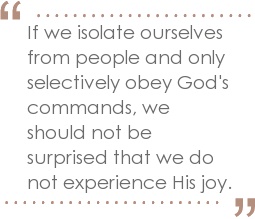Toward Arguing Better, Part 1
 Fundamentalism—and conservative Christianity in general—needs more people who argue well. It does not need more people who quarrel well!
Fundamentalism—and conservative Christianity in general—needs more people who argue well. It does not need more people who quarrel well!
Scripture opposes quarreling, along with the behaviors the KJV renders as “strifes, backbitings, whisperings, swellings” and “tumults” (2 Cor. 12:20). But arguing is something else. Scripture calls us to argue and to do it well. Every Christian is obligated to develop and exercise the skill of thinking and communicating clearly with the goal of persuasion.
With that as a working definition of argue, let’s consider a few basics for arguing better.
Argue for the right reasons.
Why do people argue? Unflattering reasons come quickly to mind. As sinners, we often argue to gain the esteem of others, to defeat someone we don’t like, or to try to win an imagined (or real) competition for loyal supporters. Sometimes people argue because they have a contrarian disposition and enjoy the challenge and repartee. (For these, the question is not “Why argue?” but “Why not argue?”)
But for Christians, the proper goal of argument is to establish the truth or rightness of ideas or actions.
 The following is taken from Hannah’s blog,
The following is taken from Hannah’s blog, 
 January, 1945. U.S. troops battle for the liberation of the Philippines. As they make their labored advance, the occupying Japanese army burns alive 150 American prisoners of war at a camp on the island of Palawan. Fearing a similar atrocity, Lieutenant General Walter Krueger assigns Lieutenant Colonel Henry Mucci and his Sixth Ranger Battalion the mission of rescuing the allied prisoners held at Cabanatuan.
January, 1945. U.S. troops battle for the liberation of the Philippines. As they make their labored advance, the occupying Japanese army burns alive 150 American prisoners of war at a camp on the island of Palawan. Fearing a similar atrocity, Lieutenant General Walter Krueger assigns Lieutenant Colonel Henry Mucci and his Sixth Ranger Battalion the mission of rescuing the allied prisoners held at Cabanatuan.

Discussion